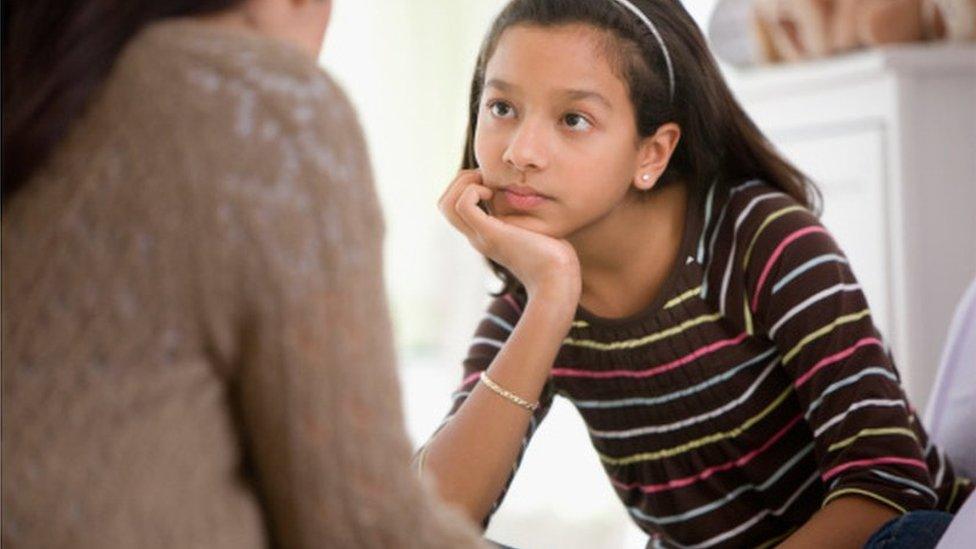Talking to children about sex and relationships
- Published

Social media and the ease of access to explicit material on the web means the tricky topic of sex is even more of a minefield for parents.
Last week, a 24-year-old teacher's concerns about teenagers' sexual activity highlighted the need for parents to engage with their children - so what's the best approach?

Tolerate the awkwardness
For many parents, talking about sex with their children is embarrassing and awkward.
But clinical psychologist Dr Abigael San says parents just have to push this feeling to one side.
"As the grown-ups, the parents, we've just got to tolerate the awkwardness and not let that create a stone wall.
"Sitting with the awkwardness that a conversation like this brings gives the message that you're there for them to speak about the issues around sex and consent."

Don't talk directly about them
Dr San says basing a conversation on someone else rather than your child is a good starting point.
"It's a bit safer to talk about when it's in the third person, when it's about someone else.
"Sometimes there are opportunities that can arise where as an adult, as a parent, we might think, here's an opportunity - if something comes up in a film or a book that they're reading that you know and you could respond to what's happening in the story.
"You know, a sex scene in a film, for example, you could talk about what's happening in it and your views and their views."
The stories of friends and relatives can also be "a way in to talk about that experience and what it was like for that person - maybe where they went wrong and what they could have done and what pressures they might have felt under".

Don't cringe and switch channels
If sex comes up on the TV, children will pick up on parents' reactions, so it's important to think about your response.
The charity Family Lives says: "If you change the channel, change the subject or make a joke every time that the subject of sex comes up, your children are more likely to believe that sex is secretive, dangerous, embarrassing or something to be ashamed or afraid of."
Kathryn Mabey, head of PSHE [personal, social, health and economic education] at Burntwood School school in London, says if sex crops up on the TV or the radio, use it as an opportunity to talk.
"I think those situations - rather than everybody sitting there cringing - could be used as conversation points that can be explored within the family, where they feel safe and able to explore those issues."

Teach a child to stand their ground
A child who is happy to go along with their peers in being generally naughty might be less confident about saying no when it comes to sexual activity.
Dr San says parents need to get the message across, from an early age, that they don't have to do things they don't want to - like showing off in front of the class or being rude to the teacher - just because others are egging them on.
"It's just social situations and really showing strong principles about that - to stand up to things, to hold their own, to hold their own confidence about things and not give in to stuff.
"Then you're engraining values about not giving in and doing anything that you don't want to do, so that when you get to these conversations when they're older, it will resonate with something that's already familiar."

Get savvy with social media
Kathryn Mabey thinks the wide use of social media is the biggest worry in terms of young people getting themselves into difficult situations sexually.
And the fact today's teenagers are digital natives in a way their parents often aren't, doesn't help.
"Often young people feel that they can't talk to their parents about it because their parents won't understand because they don't know about Instagram and so on.

"The thing is to get a bit text savvy,.. I think as a parent, you kind of need to know what's going on Instagram a bit... so we can keep an open dialogue with the kids."

Don't judge
Kathryn Mabey says it's important not to say anything that might close down the channels of conversation - now or in the future.
"My daughter's seven, and she came home saying there's a boy at school that she likes.
"So I made a point of not really pushing it and saying, 'You know you can come and talk to me about anything like that,' and not punishing her and saying, 'You're too young to have boyfriends, what do you mean 'boyfriends'?' even though I was tempted to do that.
"It was like, 'Oh that's interesting, what's his name? What do you like about him?' and not pushing it, that way they feel that they're not going to be punished if you bring up a conversation about sex.
"I want her to feel that she can talk to me about things like that. And as she gets older, presumably the conversations will change and as long as she feels she can come to me and she's not going to get told off when she says, 'Look this has happened,' maybe with a boy, as long as there's dialogue there, then I think children are safer."
Dr San says: "It's also really important not to invalidate them, their feelings and their experiences.
"It's important not to be too pushy with your own view because that in itself can be invalidating like, 'You're telling me what I think and feel, so I'm never going to speak to you,' - but it's really tricky to get the right balance."

Start talking young
NHS advice says it's never too early to start talking about sex - but just in an age-appropriate way.
"You don't have to go into detail. A short, simple answer might be enough," the advice says.
"If they ask a question, such as, 'Where do babies come from?' you could answer by saying, 'Babies grow in a woman's tummy, and when they're ready, they come out into the world.' This might be enough.
"If not, your child's follow-up question could be, 'How does the baby get in there?' You could answer, 'A man puts a seed in there.'"
The NSPCC's Jon Brown says: "How soon parents start having these conversations will depend on how old and mature their child is.
"But talking to them while they're still in primary school can help determine their level of understanding and encourage them to ask questions."

To sum up, be available
Kathryn Mabey says: "I do think openness and frankness from early on is quite important and just an environment where young people feel they can come and say when there's a problem."
"What more can you do except make sure that they know you're there for them?" asks Dr San.
- Published5 October 2017

- Published5 October 2017

- Published19 June 2017
